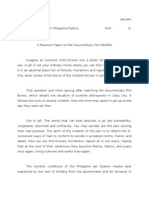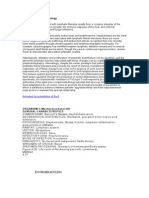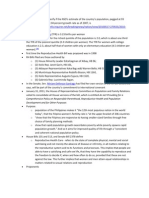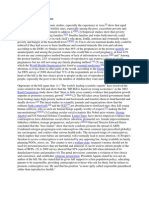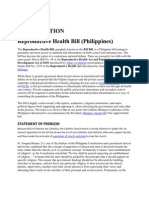The RH Bill (Pros & Cons)
The RH Bill (Pros & Cons)
Uploaded by
Ocariza ChristyCopyright:
Available Formats
The RH Bill (Pros & Cons)
The RH Bill (Pros & Cons)
Uploaded by
Ocariza ChristyOriginal Description:
Copyright
Available Formats
Share this document
Did you find this document useful?
Is this content inappropriate?
Copyright:
Available Formats
The RH Bill (Pros & Cons)
The RH Bill (Pros & Cons)
Uploaded by
Ocariza ChristyCopyright:
Available Formats
The RH Bill (Reproductive Health Bill) of the Philippines: Proponents & Opponents
PROPONENTS argue: (1) Economic studies, especially the experience in Asia, show that rapid population growth and high fertility rates, especially among the poor, exacerbate poverty and make it harder for the government to address it. (2) Empirical studies show that poverty incidence is higher among big families. Smaller families and wider birth intervals could allow families to invest more in each childs education, health, nutrition and eventually reduce poverty and hunger at the household level. (3) Ten to eleven maternal deaths daily could be reduced if they had access to basic healthcare and essential minerals like iron and calcium, according to the DOH; (4) Studies show that 44% of the pregnancies in the poorest quintile are unanticipated, and among the poorest women who would like to avoid pregnancy, at least 41% do not use any contraceptive method because of lack of information or access.. and "Among the poorest families, 22% of married women of reproductive age express a desire to avoid pregnancies but are still not using any family planning method," (5) use of contraception, which the World Health Organization has listed as essential medicines, will lower the rate of abortions as it has done in other parts of the world, according to the Guttmacher Institute. (6) An SWS survey of 2008 showed that 71% of the respondents are in favor of the bill, (7) at the heart of the bill is the free choice given to people on the use of reproductive health, enabling the people, especially the poor to have the number of children they want and can care for. OPPONENTS of the bill argue that: (1) "The world's leading scientific experts" have resolved the issues related to the bill and show that the "RH Bill is based on wrong economics" as the 2003 Rand Corporation study shows that "there is little cross-country evidence that population growth impedes or promotes economic growth. In fact the reverse seem to be true. Developing countries with young vibrant populations are stealing the economic scene from countries with aging populations. (2) The bill takes away limited government funds from treating many high priority medical and food needs and transfers them to fund objectively harmful and deadly devices The latest studies in scientific journals and organizations show that the ordinary birth control pill, and the IUD are abortifacient to 100-celled human embryos: they kill the embryonic human, who as such are human beings equally worthy of respect, making the bill unconstitutional (3) Leading secular social scientists like Nobel prize winner, George Akerlof and US National Defense Consultant, Lionel Tiger, have shown empirical evidence that contraceptives have deleterious social effects (abortion, premarital sex, female impoverishment, fatherless children, teenage pregnancies, and poverty).]Harvard School of Public Health scientist Edward Green observes that 'when people think they're made safe by using condoms at least some of the time, they actually engage in riskier sex', in the phenomenon called "risk compensation". There is evidence for increased risk of cancer (breast, cervical, liver) as well as significant increase of risk for heart attack and stroke for current users of oral contraceptives. The increased usage of contraceptives, which implies that some babies are unwanted, will eventually lead to more abortion; the correlation was shown in a scientific journal and acknowledged by pro-RH leaders, (4) People's freedom to access contraceptives is not restricted by any opposing law, being available in family planning NGOs, stores, etc. The country is not a welfare state: taxpayer's money should not be used for personal practices that are harmful and immoral; it can be used to inform people of the harm of BCPs. (5) The penal provisions constitute a violation of free choice and conscience, and establishes religious persecution. President Aquino stated he was not an author of the bill. He also stated that he gives full support to a firm population policy, educating parents to be responsible, providing contraceptives to those who ask for them, but he refuses to promote contraceptive use. He said that his position "is more aptly called responsible parenthood rather than reproductive health." (6) The resources of Planet Earth, if properly harnessed, can comfortably support up to 45 B population. Serious demographers project world population to level off at 9 Billion. It may decline after that is reached. With a population density such as France, which is not economically depressed, all the worlds population can fit comfortably into the size of Texas. So the earth with proper utilization of technology and natural resources, can really support all the humans that live on it. So the question is really not population control, but more of social justice, proper care of the earth and its resources, environmental concerns, elimination of graft and corruption, good governance, proper infrastructure.So the issue is not really population increase. The RH supporters are barking up at the wrong tree.
You might also like
- Alfred Stieglitz - Camera Work - A Pictorial Guide With 559 Reproductions (Photography Art Ebook) PDFDocument180 pagesAlfred Stieglitz - Camera Work - A Pictorial Guide With 559 Reproductions (Photography Art Ebook) PDFGeorge Kolbaia100% (9)
- Gmo SapiensDocument16 pagesGmo SapiensAlejandro García67% (3)
- Argumentative Essay 4 VaccinesDocument9 pagesArgumentative Essay 4 Vaccinesapi-30225964750% (8)
- Prison System Final EssayDocument9 pagesPrison System Final Essayapi-258926364No ratings yet
- EssayDocument5 pagesEssayMelissa SenNo ratings yet
- The Rizal LawDocument5 pagesThe Rizal LawjacijanebabyloveNo ratings yet
- Reproductive Health Bill in The PhilippinesDocument4 pagesReproductive Health Bill in The PhilippinesJhazzryll Catanes MocayNo ratings yet
- ScriptDocument3 pagesScriptRaymond Camacho GutierrezNo ratings yet
- Early Science in MesoamericaDocument69 pagesEarly Science in MesoamericaVeda Leigh SyNo ratings yet
- Visualizing The History of PandemicsDocument6 pagesVisualizing The History of PandemicsJerassimos MonokrousosNo ratings yet
- Zika Unproven Virus Dont Kill, Medicines KillDocument31 pagesZika Unproven Virus Dont Kill, Medicines KillfrancisnjoeNo ratings yet
- H1N1-Journalist Files Charges - 2Document4 pagesH1N1-Journalist Files Charges - 2RedzaNo ratings yet
- EXPERTS AGAINST LOCKDOWN - International ALERT MESSAGE of Health Professionals To Governments & Citizens of The WORLDDocument25 pagesEXPERTS AGAINST LOCKDOWN - International ALERT MESSAGE of Health Professionals To Governments & Citizens of The WORLDPeter100% (2)
- Population Control-Today and Tomorrow - J. KasunDocument4 pagesPopulation Control-Today and Tomorrow - J. KasunAbriel HaqqaniNo ratings yet
- Gay Marriage Is AcceptableDocument9 pagesGay Marriage Is AcceptableKeanna Mae LawasNo ratings yet
- Religion ReviewerDocument2 pagesReligion ReviewerCarlos, Jolina R.No ratings yet
- Street Childern SpeechDocument3 pagesStreet Childern SpeechBagas Muhammad RasyifNo ratings yet
- Event201 Model DescDocument3 pagesEvent201 Model DescRuth CandorNo ratings yet
- Biology: Mounting Antiscience Aggression in The United StatesDocument4 pagesBiology: Mounting Antiscience Aggression in The United StatesNatalie WintersNo ratings yet
- Ethnic Specific Genetically Engineered WeaponsDocument135 pagesEthnic Specific Genetically Engineered WeaponsEyemanProphetNo ratings yet
- Reason Behind My ChoicesDocument1 pageReason Behind My ChoicesJennylyn RosasNo ratings yet
- They'Re Called The Good Club - and They Want To Save The World - World NewsDocument3 pagesThey'Re Called The Good Club - and They Want To Save The World - World NewsDr.Willy Holmes-Spoelder100% (1)
- Nunes To Biden - COVID-19Document2 pagesNunes To Biden - COVID-19Washington Examiner100% (1)
- How Ivermectin WorksDocument2 pagesHow Ivermectin WorksGeoffrey Go100% (1)
- GOP Letter To DOJ On EcoHealth AllianceDocument2 pagesGOP Letter To DOJ On EcoHealth AllianceWashington ExaminerNo ratings yet
- Responsible Parenthood and Reproductive Health Act of 2012Document11 pagesResponsible Parenthood and Reproductive Health Act of 2012Mar VinNo ratings yet
- FDA Meeting. Human Tumors For Vaccine ManufactureDocument80 pagesFDA Meeting. Human Tumors For Vaccine ManufactureDustin Estes87% (30)
- HR 6666Document2 pagesHR 6666Jack NestelroadNo ratings yet
- Vaccinations Argumentative Essay - Lyla AlmoninaDocument3 pagesVaccinations Argumentative Essay - Lyla Almoninaapi-4441503820% (1)
- Communication and Globalization - JRDDocument6 pagesCommunication and Globalization - JRDBry RamosNo ratings yet
- Imagine An Innocent Child Thrown Into A Pitiful For Transgressing The LawDocument4 pagesImagine An Innocent Child Thrown Into A Pitiful For Transgressing The LawPhaura ReinzNo ratings yet
- Globalization of ReligionDocument8 pagesGlobalization of ReligionMaire NaragNo ratings yet
- REBUTTALDocument3 pagesREBUTTALRoxanne GongobNo ratings yet
- Pornography On Today's YouthDocument2 pagesPornography On Today's YouthJaaaNo ratings yet
- Effects of Reproductive Health Bill in The PhilippinesDocument7 pagesEffects of Reproductive Health Bill in The PhilippinesLeigh Escudero0% (1)
- LYMPHDocument9 pagesLYMPHAnna AmonoyNo ratings yet
- Dead StarsDocument30 pagesDead StarsDar Lynn100% (1)
- Was There A Wuhan Lab Leak ? - COVID-19 OriginsDocument7 pagesWas There A Wuhan Lab Leak ? - COVID-19 OriginsKevin Steiner100% (1)
- 29 01 2013 PDFDocument48 pages29 01 2013 PDFebrandeNo ratings yet
- An Essay On Mandatory Vaccination by Russell BlaylockDocument7 pagesAn Essay On Mandatory Vaccination by Russell BlaylockMatthew Sharp100% (1)
- TERM PAPER SampleDocument9 pagesTERM PAPER SampleSally Tamayo AbasNo ratings yet
- Plant Based VaccinesDocument12 pagesPlant Based VaccinesMUGDHA MITTALNo ratings yet
- RAPPLER - TIMELINE - SOGIE Equality in The PhilippinesDocument5 pagesRAPPLER - TIMELINE - SOGIE Equality in The Philippineslianne_rose_1No ratings yet
- Dig Biden Harris Presidential Transition Moneygrab2Document71 pagesDig Biden Harris Presidential Transition Moneygrab2DGB DGB75% (4)
- Research PaperDocument10 pagesResearch PaperMiles YordanNo ratings yet
- Ethical Issues in Genetic Engineering and TransgenicsDocument8 pagesEthical Issues in Genetic Engineering and Transgenicssanghamitra janaNo ratings yet
- Elizabeth Cady StantonDocument6 pagesElizabeth Cady Stantonemmi428No ratings yet
- Selling Sex in Heaven Reaction PaperDocument4 pagesSelling Sex in Heaven Reaction PaperJoshua Tan CoNo ratings yet
- Internet and COVID-19: Information and Misinformation: Covid-19 em Debate Covid-19 em DebateDocument2 pagesInternet and COVID-19: Information and Misinformation: Covid-19 em Debate Covid-19 em DebateFebria Rike Erliana100% (1)
- Anthony Fauci's Love Letter To HRC, 1 MoreDocument7 pagesAnthony Fauci's Love Letter To HRC, 1 MoreM LicciardelloNo ratings yet
- Remdesivir LetterDocument9 pagesRemdesivir LetterJennifer Weaver100% (2)
- Pathogenesis and PathologyDocument12 pagesPathogenesis and Pathologydies100% (1)
- Fun VaxDocument115 pagesFun VaxPeter T. Santilli100% (1)
- Whether or Not Same Sex Marriage Be AlloDocument10 pagesWhether or Not Same Sex Marriage Be AlloAlyanna Isabelle DimayugaNo ratings yet
- PlutocracyDocument6 pagesPlutocracyfuturistzg100% (1)
- DAPAT BA SIRAIN ANG KALIKASAN UPANG UMUNLAD - Filipino DebateDocument2 pagesDAPAT BA SIRAIN ANG KALIKASAN UPANG UMUNLAD - Filipino DebateShan McCrawNo ratings yet
- Extemporaneous SpeechDocument6 pagesExtemporaneous SpeechKhrizia Leen IndayNo ratings yet
- Child Labor SpeechDocument2 pagesChild Labor SpeechVania0% (1)
- RH Bill Pros and ConsDocument3 pagesRH Bill Pros and ConsTeresa Cardinoza100% (5)
- !""S S S# S " $SS "S S" "%&% ' &&&"%' S'' (SDocument3 pages!""S S S# S " $SS "S S" "%&% ' &&&"%' S'' (SIam MsGemNo ratings yet
- RH BillDocument4 pagesRH BillJaymark LambinoNo ratings yet
- Albay 1st District Edcel Lagman Miriam Defensor SantiagoDocument7 pagesAlbay 1st District Edcel Lagman Miriam Defensor Santiagoyoshin22No ratings yet
- Uncle Bens AdvicesDocument9 pagesUncle Bens AdvicesSaadNo ratings yet
- Amplivox Otosure Desktop Operating ManualDocument26 pagesAmplivox Otosure Desktop Operating ManualJuan PáezNo ratings yet
- Article 1 Homonyms PDFDocument23 pagesArticle 1 Homonyms PDFNuel Angelo SabateNo ratings yet
- The Book of CharacterDocument195 pagesThe Book of Charactersddq100% (1)
- Kathrein-Broadcast-Gmbh-Gta 2022 01 14Document62 pagesKathrein-Broadcast-Gmbh-Gta 2022 01 14davidkrizNo ratings yet
- Wonders Reader Grade 1 Unit 2 06 (Beyond Level)Document19 pagesWonders Reader Grade 1 Unit 2 06 (Beyond Level)Soul City RockerNo ratings yet
- Sonic Boom GeneratorDocument28 pagesSonic Boom Generatorsoho54No ratings yet
- SSC CGL Tier 2 SyllabusDocument2 pagesSSC CGL Tier 2 SyllabusGyanendra VermaNo ratings yet
- Anatomy and Physiology of Farm AnimalsDocument169 pagesAnatomy and Physiology of Farm AnimalsKRIZZAPEARL VER100% (1)
- Kaspersky Internet Security 2013: Reviewer's GuideDocument25 pagesKaspersky Internet Security 2013: Reviewer's GuideRahul GhoshNo ratings yet
- Kuwait Heavy Crude Oil - Material ChallengeDocument15 pagesKuwait Heavy Crude Oil - Material Challengesuperjerix100% (1)
- Modbus Implementation in APC Smart-UPS v12Document30 pagesModbus Implementation in APC Smart-UPS v12bahramNo ratings yet
- Instant ebooks textbook Science You Can Eat 1st Edition Stefan Gates download all chaptersDocument65 pagesInstant ebooks textbook Science You Can Eat 1st Edition Stefan Gates download all chapterswalinstcinx5100% (3)
- Realization of Logic Gates Experiment ReportDocument4 pagesRealization of Logic Gates Experiment ReportSayan KarmakarNo ratings yet
- DETAILED-LP-grade 8 Examining BiasesDocument4 pagesDETAILED-LP-grade 8 Examining BiasesCherry De PacenaNo ratings yet
- Franchising USA - May 2020 PDFDocument58 pagesFranchising USA - May 2020 PDFAzizNo ratings yet
- Alp Intermediate 11Document3 pagesAlp Intermediate 11Jhon Hector Aire ArtezanoNo ratings yet
- 100 Ways To Say "I Love You"Document9 pages100 Ways To Say "I Love You"saiyedsultana7No ratings yet
- Road Test SSR - 2020-21Document5 pagesRoad Test SSR - 2020-21Krushna LondheNo ratings yet
- Cwts 1 Final Examination Pointers To ReviewDocument2 pagesCwts 1 Final Examination Pointers To ReviewKian YumulNo ratings yet
- Introduction To ZoologyDocument52 pagesIntroduction To ZoologyGlen MangaliNo ratings yet
- Coefficient For Negative Moments in Slab (W Total DL + LL)Document3 pagesCoefficient For Negative Moments in Slab (W Total DL + LL)Kim Limuel Tabago GomezNo ratings yet
- 9811 - Veolia Africa - Annual Review (Eng) V12 - 0Document13 pages9811 - Veolia Africa - Annual Review (Eng) V12 - 0Ralu BunaNo ratings yet
- Product Expert Series: The Evolution of FabricationDocument3 pagesProduct Expert Series: The Evolution of Fabricationsaravanan_c1No ratings yet
- HS Unit 1. Life Stories We Admire. - Global Success 12Document11 pagesHS Unit 1. Life Stories We Admire. - Global Success 12Suga MinNo ratings yet
- A Rose For Emily Critical EssayDocument56 pagesA Rose For Emily Critical Essayozvvfacaf100% (3)
- Step 1: Trade Flow and Classification SystemDocument4 pagesStep 1: Trade Flow and Classification SystemBruno Acero SotoNo ratings yet
- Humanise Students Needs' - A Research AssignmentDocument4 pagesHumanise Students Needs' - A Research AssignmentGeorge PhilipsNo ratings yet






























